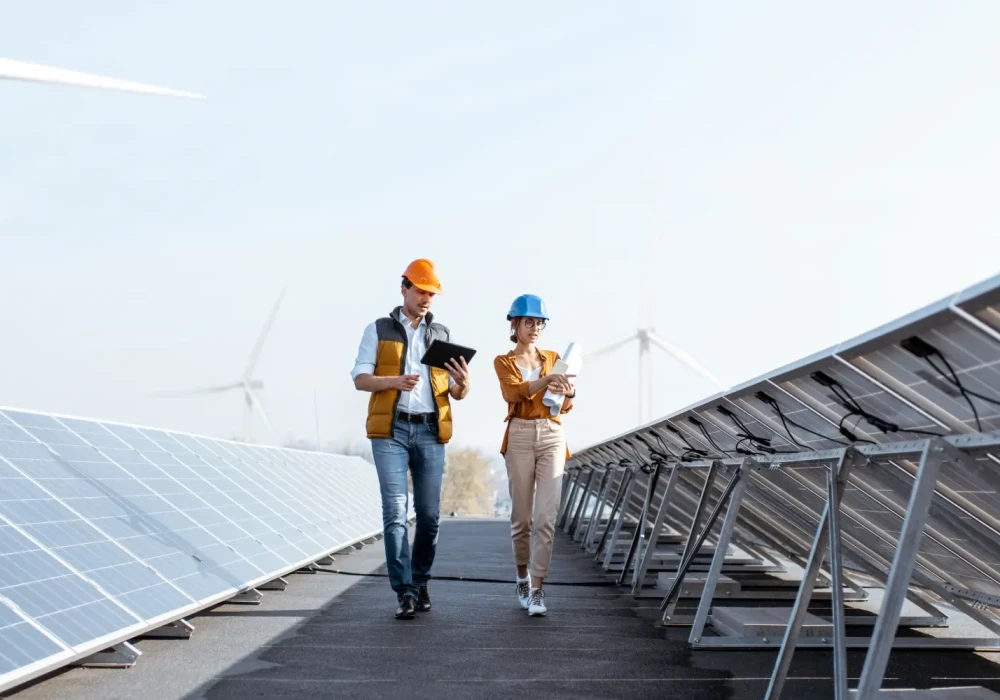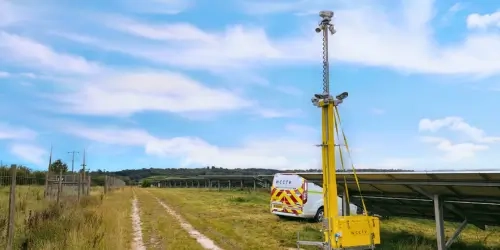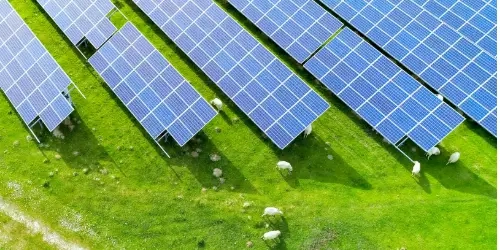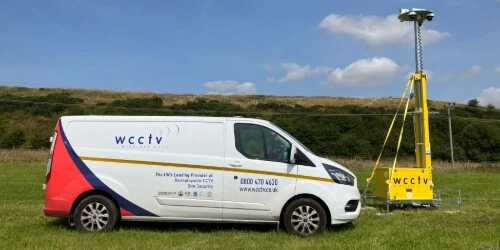These solar installations generate clean electricity for millions of homes and businesses across the UK and represent billions of pounds in investments. However, the rapid expansion of large-scale solar farms across the nation has also created unexpected problems.
The remote nature of renewable energy developments, combined with high-ticket items such as solar panels and inverters, makes them attractive targets for criminals, vandals and thieves.
In this guide, we'll explore the main solar farm threats in the UK and offer practical solutions to tackle them efficiently.
What Makes UK Solar Farms Vulnerable to Security Threats?
Several elements make UK solar farms vulnerable to security threats.
Critical infrastructure and high-value equipment, such as solar panels, industrial-grade inverters, solar batteries, mounting stations and copper cabling, make renewable energy plants prime targets for theft and vandalism.
Then there's the remote location of UK farms. Most installations are built in large, rural areas where emergency response times are slow and immediate help from local authorities is miles away. These isolated environments give criminals the time and space they need to operate undetected.
Criminal gangs have also become more sophisticated, often using drone surveillance to scout farms before striking.
With security breaches on the rise, the importance of solar farm security is no longer optional, but a necessity.
What Are The Most Common Dangers UK Solar Farms Face?
Solar farms across the UK come up against a range of threats that can disrupt operations and incur significant costs. Below are the 5 most common solar farm threats UK companies face and how to address them effectively:
1. Theft
Theft is the biggest threat to solar farms. Police reports reveal a 48% increase in solar panel and copper cable theft between 2021 and 2022.
Why is this a problem for solar farms?
Copper cabling has become increasingly appealing to criminals due to its rising value. Copper prices increased by 12.09% between March 2024 and March 2025, fuelling black market demand both in the UK and abroad. In some cases, thieves have stolen thousands of metres of cabling in a single incident, causing massive financial losses for operators.
Commercial-grade solar panels are another prime target. A fully installed 50 kW system can cost anywhere between £33,000 and £60,000. Because ground-mounted solar components are relatively easy to remove and transport, they're particularly attractive to organised crime gangs who can strip entire rows in hours.
The financial impact extends far beyond replacement costs.
When panels, mounting brackets and cables are stolen, solar capacity is halted. Revenue losses add up quickly while you wait for insurance claims and replacement equipment.
Plus, insurance premiums often increase after theft incidents. Some insurers may even refuse coverage if security measures are deemed inadequate.
Here are a few solutions to consider:
- Remote monitoring services help take site security a step further. Our fully-managed service, with remote monitoring and audio challenge capabilities, can deter criminals in real-time. When a threat is detected, our NSI Gold-accredited monitoring centres issue an immediate response, preventing theft before it happens.
- Perimeter protection systems create physical barriers that prevent unauthorised entry. Anti-climb fencing compliant with British anti-intrusion standards, secure access control and anti-tamper screws and padlocks make it much harder for criminals to access your site undetected.
- Intruder detection solutions such as motion sensors, perimeter intrusion detection (PIDS) systems, Time Lapse and Automatic Number Plate Recognition (ANPR) cameras help deter criminal activity and minimise the risk of theft, vandalism or damage.
- Temporary CCTV solutions are ideal for new solar farm developments and those under construction. These fully self-contained towers are designed to provide day-to-night surveillance without the need for fixed infrastructure.
- CCTV Towers offer comprehensive surveillance for large solar farms. Equipped with high-quality PTZ cameras and up to 6 metres tall, they provide near-360° camera coverage, ensuring solar projects are protected at all times.
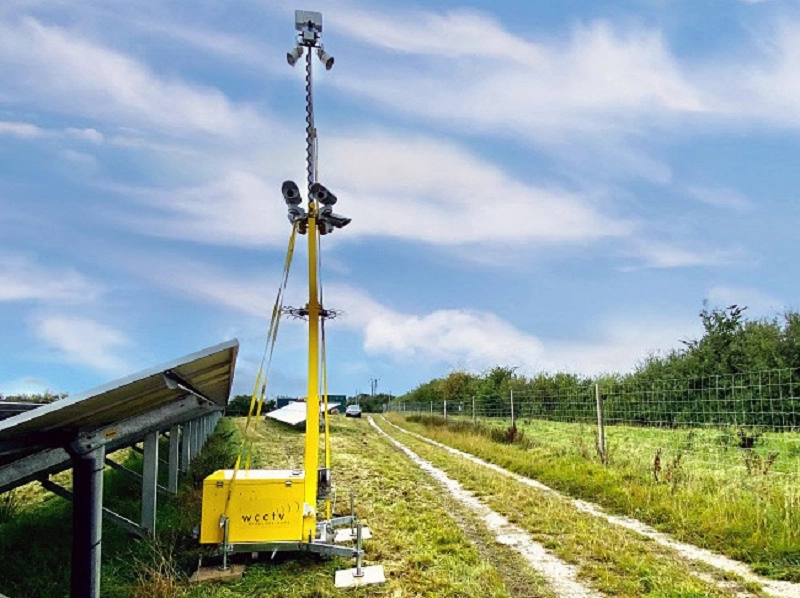
2. Vandalism and trespassing
Vandalism includes damage to panels, fences, cabling, inverters and other solar power equipment.
Why is this a problem for solar farms?
As we mentioned, solar farms and new solar development sites are often situated in remote locations with limited supervision, making them vulnerable to vandals, trespassers and squatters. Damage may be caused by thrill-seekers, protest activity or even individuals such as hikers, dog walkers and local residents who are unaware they're on private property.
Vandalism and trespassing can lead to expensive repairs, replacements, operational disruptions and potential safety issues. Solar farm operators may also face public liability claims if an unauthorised person is injured on their solar site, leading to costly legal battles and/or increased insurance premiums.
Here are a few preventative strategies to consider:
- 24/7 CCTV Monitoring provides full-spec, day-to-night surveillance in real-time. Rather than traditional devices that just record what happens, our Remote Monitoring Services actively help prevent threats from developing and trigger immediate emergency action.
- Perimeter surveillance and intrusion detection systems like our fully autonomous Hornet deliver near-360° coverage using 4 integrated cameras, passive infrared (PIR) detection, powerful audio deterrents and high-intensity visual alarms, providing rapid, on-site protection in minutes.
- Physical deterrents like fencing, security lights and CCTV signage show that surveillance is in place, helping to prevent casual trespassing and opportunistic vandalism.
- Mobile Keyholding and Alarm Response services ensure a quick response to verified alarms. Our fully-managed service includes immediate dispatch of security personnel to deal with trespassers, vandals and thieves, removing the burden from your operations team.
3. Environmental factors
Extreme weather conditions such as heavy rain, strong winds, fog and snow can interfere with the performance and reliability of solar farm security systems.
Why is this a problem for solar farms?
The UK's unpredictable winter weather conditions can significantly impact traditional surveillance equipment, especially in rural, exposed locations. High winds can shift camera angles or damage mounting systems, while heavy snow can block camera views completely.
Damaged or blurred security systems may fail to detect genuine intrusions. Poor quality footage makes identification difficult and false alarms from fallen trees can lead to wasted resources.
Here are a few solutions to consider:
- Thermal CCTV Solar Towers: Our solar-powered CCTV systems combine thermal and optical cameras with automatic image fusion to detect and deter intrusions. Ideal for off-grid locations, this system's edge-based video analytics trigger real-time alerts, voice-down warnings and evidence recording, providing 24/7 detection of persons and vehicles in darkness, dust or fog.
- Infrared (IR) lighting: CCTV Towers equipped with advanced infrared night vision help improve video quality and surveillance footage in poor lighting conditions. Featuring high-definition PTZ cameras with IR night vision, our Eco Towers are ideal for projects in locations with restricted power or poor environmental conditions, operating for up to 150 hours between charges.
- Remote monitoring and diagnostics: All of our Rapid Deployment CCTV systems include integrated routine remote diagnostic assessments through our Heartbeat software, which indicate any connectivity issues, camera failures, hard disk issues and recording problems. Our systems also feature advanced analytics that filter out environmental false alarms set off by wildlife, moving foliage or the like.
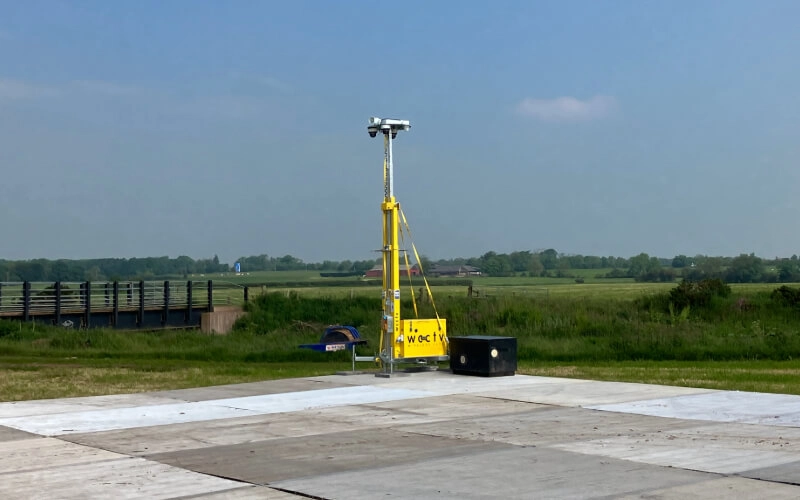
4. Cyberattacks
Cyberattacks are a growing threat to modern solar farms, targeting operational technology (OT) and information technology (IT) systems. These attacks can involve hacking control systems (SCADA), ransomware, malware and data breaches.
A 2024 report from a UK-based specialty insurance group reported a 586% increase in data breaches affecting utility companies.
Why is this a problem for solar farms?
The increasing digitisation of solar farm operations, including remote monitoring, mobile apps and cloud platforms, may create new opportunities for hackers to gain unauthorised access.
The impact of successful cyberattacks can be significant. Operational disruption affects power generation and revenue. Data breaches can result in financial losses, regulatory fines and reputational damage if systems controlling safety mechanisms are compromised.
Here are a few ways to protect your sensitive data:
- Robust cybersecurity protocols such as strong firewalls, data encryption, multi-factor authentication, network segmentation and regular software updates lay the foundation for online security.
- Regular online audits and diagnostic testing help identify vulnerabilities and ensure optimal performance of security systems.
- Our Rapid Deployment systems feature in-built remote diagnostics through our cloud ecosystem, Stellifii, which monitors system health and identifies potential security issues automatically. It integrates video, analytics and IoT data within a robust cloud platform built to provide users with complete oversight, user-friendly operation and practical insights.
5. Inadequate solar security systems
Many solar farms and development sites fall victim to threats because they've invested in low-quality or poorly maintained security systems.
Why is this a problem for solar farms?
Standard security equipment designed for urban environments may not work in rural settings, extreme weather or large-scale solar installations. Investing in subpar security can also make solar farms more susceptible to theft.
Lack of professional monitoring means even good cameras provide little real-time protection. Recording-only systems capture evidence after crimes have been committed but do nothing to prevent incidents. Grainy footage from low-quality cameras also creates security gaps that won't help police identify thieves or support insurance claims.
Here are a few preventative strategies to consider:
- Invest in professional systems designed specifically for challenging outdoor environments. All our operations undergo regular annual audits to ensure top-tier accountability and performance.
- Specialist solar farm security providers: We are the UK's leading supplier of rapidly installed, mobile CCTV systems, specifically designed for temporary security or targeted surveillance applications.
- Managed services: Our fully-managed services ensure continuous system functionality, proactive maintenance, professional monitoring and rapid emergency response, removing the burden from your operations team.
Prevent Solar Farm Threats With WCCTV Today
UK operators in the solar energy sector face several real threats. Theft, vandalism, environmental factors, cyberattacks and poor security measures can all seriously impact your operations, green energy generation and profitability.
The good news is that these threats can be managed effectively with the right, multi-layered approach. Perimeter surveillance, Temporary CCTV solutions, Time Lapse Cameras, Remote Monitoring Services and regular diagnostic testing provide comprehensive protection for your valuable solar assets.
We bring over two decades of experience in wireless security systems. Our fully-managed approach means you get comprehensive coverage without the management overhead.
You don't need to manage security alone. Contact us today to discuss tailored security solutions for your UK farm.
